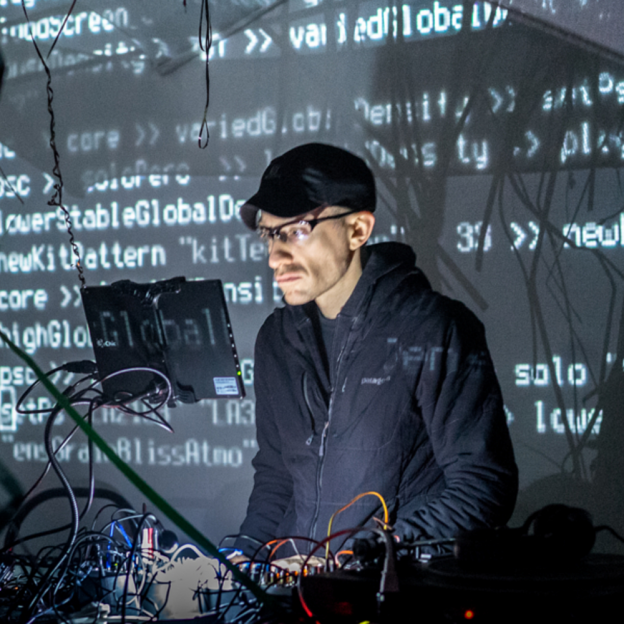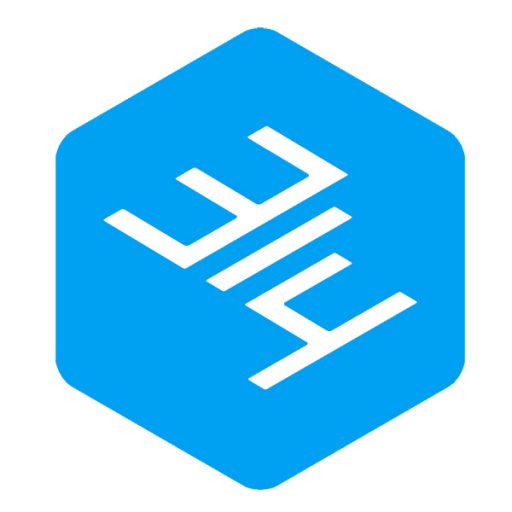
Capitalism fails artists: An interview with Renick Bell
Algorave ambassador Renick Bell works with sound, image and code. After several years in Tokyo, he’s now based in Taipei, though he can be frequently found on the road (not this year, presumably), his live coding imbuing clubs and festival venues with his sonic and visual tapestry. He improvises bass-heavy, algorithmically generated music full of percussion and noise by live coding with open-source software, which he himself developed, called Conductive. His empirical practice – let’s call it performing or playing – is coupled with academic research centred around live coding, electronic music and art, as well as writing software. His releases have appeared on labels such as Halcyon Veil, UIQ and Seagrave. Aphex Twin selected him for his first-ever curated event in 2019. Renick Bell will be playing at the upcoming Next Festival, which is happening online at https://nextfestival.sk/2020/.
Can you talk about your background? You studied electronic music, philosophy and music technology. But what led to this? What sparked your interest in electronic music, growing up in Texas, which we don’t necessarily associate with electronic music as such (New York, Chicago, Detroit being the hotbeds of this music in the US).
My father introduced me to electronic music through his music collection, which included Vangelis, Tangerine Dream, and Wendy Carlos among a lot of jazz, as well as getting me interested in a radio program called Music from the Hearts of Space. I got a low-end Yamaha synth at an early age. It was fun to turn up the tempo to very high levels on the drum accompaniment function and jump around the various genre-based patterns it had (samba, disco, rock, etc.). It also included some rudimentary timbral control parameters. In university I was lucky to have two resources: an open-minded professor called Dr. Steve Paxton with a university electronic music studio and a close friend called Kevin Wheeler who had a lot of production knowledge and gear.
The Detroit techno pioneers making electronic music drew from many sources, from the likes of George Clinton & Afrofuturism, Kraftwerk, sci-fi and Alvin Toffler (Future Shock, etc.). Have you ever had a desire to make music that is futuristic? Can the term “futuristic” still be applied to music these days when we think everything has been done before and sampling is a basic tool of production?
My aim has never been futuristic, I think. That’s not to say I’m not interested in the future, because I am, but I’m making the music I can make now. I want people to use it now. It’s music to experience now (and hopefully in the future too). The cynicism that everything has been done before is a poison that we’d be much better off without. It’s pure laziness and lack of imagination. All electronic music is in its infancy. There is so much territory to explore. Believing otherwise is inexcusable.
You mentioned being inspired by British dance music, particularly jungle and hip-hop. How do you work with concrete sounds and references?
It is impossible to make music without being influenced by what one has heard. The sounds I use are almost completely generated in my studio, but they are all also informed by my listening habits. Jungle and hip-hop are essential parts of that. They are equally my teachers for showing me categories of sounds that can exist. All culture is built on top of influences. It is a contemporary challenge how to adequately compensate people for their cultural contributions. Socialism and acknowledging influences are the best way I know of to handle this problem.
At the core of your production are algorithms, which are superficially associated with cold, analytical, commercial pursuits, especially in music (Spotify algorithms etc.). As an open-source and community-oriented entity, the algorave scene seems to be its polar opposite.
I believe many feel that way because of unfamiliarity and capitalism using them because they are effective. Being analytical can be warm; imagine an algorithm that seeks to optimize resource allocation to all people based on their needs rather than their usefulness to capitalists.
Certainly there are flawed algorithms that are causing suffering in the world, but it is the fault of sponsors, designers, and developers rather than the use of algorithms. Don’t let people escape their responsibilities. Open source ideology is very important to me. I hope that the algorave scene is contributing to its acceptance.
Several programmes have been developed within the community (TidalCycles, SuperCollider, etc.). Why did you decide to create your own software?
I had musical ideas that I couldn’t express in other software (either because they were incapable or I lacked knowledge). As a result, I made my own. TidalCycles was not available when I started developing mine, but I did ask Alex (McLean – initiator of the TidalCycles platform) at the time if he’d let me use it. For better or worse, it wasn’t ready then.
Can you talk about the philosophical and ethical aspects of your work and the algorave scene as such?
There are many, but one that is important which I get few opportunities to discuss is the Tao Te Ching. For me, improvising is a way to practice it. I want my work to reflect its teachings, including its emphasis on the contingent nature of life. I’m working with Joana Chicau on software and performances which also point to philosophical and ethical positions explicitly. You can find more about it at http://geometries.xyz.
In what way does aesthetic come into the equation in your work?
I believe it is about the experience of the work and the feelings that result. That varies depending on who is experiencing it and many other factors; that’s clear to me from the differences in the kinds of reactions I get from audience members. A professional programmer has a different experience of a performance than a visual artist, even though they are superficially experiencing roughly the same set of things. I am trying to design specific experiences, and sometimes I do aim to provide challenging ones. Other times I try to provide experiences which give feelings of flow or groove. All of this is aesthetic thinking as far as I am concerned. This topic is way too big for one question, though (it was the topic of my PhD!).
Do you think the algorave scene has the potential to become more widely spread as more and more people are learning to code?
I think so, but it will depend on many other factors. It seems natural that as familiarity with coding increases, more people will use that skill to produce music or art. There are people who say “I spend all day behind a computer; the last thing I want to do after work is look at a computer again”, but for me anyway the computer is not a burden but more like water. I don’t think I’m alone in that regard.
How do you see the future of music and technology in respect to AI and technological development? It has often been portrayed as dystopian (deepfake music etc.).
I view cynicism about technology the same as I view it about music. It’s up to individuals and cultures to ensure that these tools are used for humanity’s benefit. There are countless possibilities for interesting and useful things to be developed.
You once said in an interview that “live coding allows us to perform with symbol rather than gesture”. Can you elaborate on this?
Traditional instruments make sound through gestures like banging or blowing mostly. There’s a one-to-one or one-to-few correspondence in most cases. Live coding is completely different in that symbols when interpreted by the computer result in possibly hours of complex sounds. Inputting those symbols doesn’t immediately trigger sound, unlike hitting a traditional instrument. Instead of strumming or plucking, live coders send text which encodes symbols to their programming language interpreters which produce the sound through a chain of processes.
You lived in Tokyo for a while, a city known for its cutting-edge technologies and thriving music scene. Would you say that the environment has influenced your work?
As of August, I’m based in Taipei again. The environment must be an influence in uncountable ways. Definitely I have benefitted in many ways through the many opportunities I have had to perform in Tokyo; the highly developed Tokyo noise scene has influenced me over the years, I’m sure; it’s given me many opportunities to be unconstrained about the sounds I make in front of an audience on loud sound systems, and that has helped me to evolve my sound. The ease of being a vegetarian in Taipei is hugely important; being able to eliminate a category of distraction gives more energy for other things.
You posted the following on your blog: “Most of us are shocked by the covid-19 crisis. At the same time, there is a kind of inevitability to it considering the social and economic path of our societies. I would like you to consider the reasons and the solutions.” How do you see this path our society has been on, as well as how it impacts artists and vice versa?
Capitalism is a running disaster. Its role in unleashing zoonoses on us is just one of many ways in which it is an obstacle to a healthy civilization. Capitalism fails artists as well. Artists can play a role in our exit from capitalism by helping the populace to see its failures, to provide temporary relief from the emotional suffering it brings us, and to imagine possibilities beyond it.
